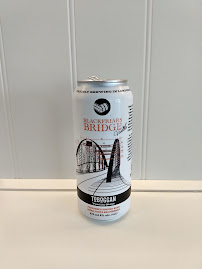No, I didn't drink these all at once. Not that it hasn't been tempting during this past year of pandemic.
Actually, this can collection illustrates a point, which is that there's lots of craft breweries (and cideries) in Southwestern Ontario and many of them are featuring local history on their cans. Which is interesting for me because beer and history are two of my favourite things. They both give me a "buzz."
Craft beer is an extraordinary phenomenon with new small breweries popping up all the time. Our society is rejecting large-scale production by multinationals, in brewing at least. London's very own Labatt may be one of the largest brewers in Canada but it's now Belgian-owned (I think - the number of mergers in recent years makes it hard to keep track) and many of us prefer to support smaller, locally-owned businesses.
It makes sense for smaller breweries to feature local history, landmarks, and folklore on their cans. It gives their product a uniqueness and character companies like Labatt can no longer claim. Those of us who buy the bevvy not only enjoy a refreshing drink but learn something while we're at it. Observe the following:
Toboggan, based on London's Richmond Row, takes its name from a toboggan slide built nearby in the 1800s. This particular lager, though, features the First Hussars' Sherman tank, Holy Roller, which sits across the street in Victoria Park. Holy Roller landed in Normandy on D-Day, June 6, 1944 and has been in the park since 1956 and is recently refurbished. According to the Toboggan website, a portion of beer sales goes towards preserving the tank and supporting Canadian veterans, both worthy goals.
Railway City Crew
The city of St. Thomas, Elgin County, is the "Railway City," having once been Canada's railway capital. According to the city's tourist website, a total of eight railways brought in more than one hundred trains a day in 1914. Every freight train in the old days had a "crew," of course, usually consisting of a conductor, two trainmen or brakemen, an engineer, and a fireman.
But for most of us, St. Thomas is the city that killed an elephant:
Railway City Dead Elephant
Poor Jumbo. P. T. Barnum's circus elephant was killed in St. Thomas on September 15, 1885. He had just finished his performance that evening and was being led to his box car when a train came roaring down the track. He was hit and fatally wounded, dying within minutes.
Sad story, but a nice I.P.A.
A little farther afield, up in Blyth, Huron County, Cowbell Brewing Co. pays tribute to a nineteenth-century veterinarian, Doc Perdue, who rescued and cared for animals, including a bear cub named Bruin. According to the can, when Bruin grew up, Perdue featured him in impromptu boxing exhibitions.
Back in London, you can find Powerhouse Brewery in the repurposed Kellogg's Factory in Old East Village. The brewery takes its name from its home in the electrical facility of the old cereal factory, proudly pictured on all their cans. The Kellogg's plant closed in 2014, ending the company's 100-year presence in London.
Just found Blackfriars Bridge stout in a can. Features London's very own recently-refurbished Blackfriars Bridge which, of course, is not far from Toboggan itself. The bridge has been portrayed in many artistic works, including a series of stained glass windows by Ted Goodden, but it was about time it appeared on a beer can. One of my favourites.
When many people think of local history, they think of the Donnellys. Black Donnellys Brewing Co., near Mitchell, pays tribute to the Donnelly family with this IPA. "Trouble's brewing." Indeed.







